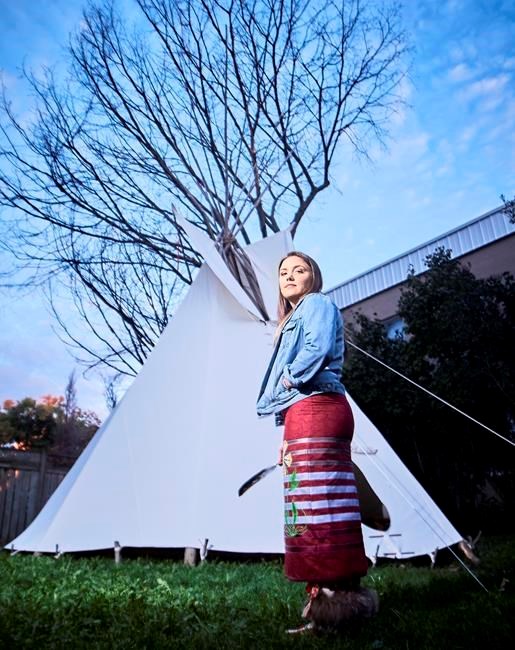MONTREAL — An Indigenous engineering student is this year's recipient of the Order of the White Rose from Polytechnique Montreal in memory of the victims and survivors of the 1989 anti-feminist attack on the school.
Brielle Chanae Thorsen, 22, says the lives of the 14 women cut short by the massacre at what was then known as Ecole polytechnique must never be forgotten, but real work remains in achieving full equality.
“We all need to remember the women who came before us, especially the victims and survivors of the Polytechnique tragedy," Thorsen, a Cree woman, said in an interview.
"We must all have an equal opportunity to pursue a rewarding career without being the targets of discrimination or violence, regardless of our gender, race, sexuality, or religion.”
That wasn't the case for the 14 women — mostly students — gunned down. Thirteen others — nine women and four men — were injured by Marc Lepine during a 20-minute shooting rampage at the Montreal engineering school on Dec. 6, 1989.
At a virtual ceremony held Thursday to announce the scholarship, Thorsen revealed that she had been the victim of a sexual assault in her dorm two days before beginning university. "This award has special significance to me, because I am a survivor of on-campus violence," she said.
She added that the assault made her university experience a struggle. "I learned the hard way that we don't all have an equal opportunity to succeed in university," she said. "How can you be a perfect student when you're undergoing a significant life-altering event?"
On the same day her award was announced, members of the House of Commons observed a minute of silence to honour the lost lives ahead of the 31st anniversary of the killings on Sunday.
Prime Minister Justin Trudeau said it is our duty to never forget the misogynistic, anti-feminist nature of the attack that struck at the very heart of society's values.
In May, the government outlawed some 1,500 types of assault-style firearms, including the Ruger Mini-14 used by the killer in Montreal. And Trudeau said the government would be introducing legislation to follow through on his government's commitment to protect against gun violence.
"Canadians know that there is no place in our country for weapons designed to kill the largest number of people in the shortest amount of time. They know that these weapons were not designed to hunt deer," he said in reference to the banned assault-style firearms.
Conservative Leader Erin O'Toole did not mention gun control but called for a recommitment to ending violence towards women and vulnerable people.
"And in a pandemic, when worry and mental health is touching every corner of our country and every family within the Canadian family, let's make sure that no one is isolated, no one is forgotten, and that there is a zero tolerance towards violence in our society," he said.
NDP Leader Jagmeet Singh noted that Indigenous women and girls are more likely to face violence and more likely to be killed. He said action on calls for justice from the national inquiry into missing and murdered Indigenous women has been "too slow in coming."
Thorsen, a member of the Saddle Lake Cree Nation in central Alberta, intends to pursue a master's degree in mechanical engineering at Queen’s University in Kingston, Ont., where she obtained her bachelor's degree in mechanical engineering and mathematics.
Although she was born after the tragic events of 1989, Thorsen is well aware of what happened that day. And she knows that this $30,000 scholarship, awarded to a Canadian female engineering student looking to pursue graduate studies in the field, carries a special weight and significance.
Remembering the victims and survivors is important, because "their efforts and their lives have enabled me and my classmates to study safely,” she added
But more than 30 years later, barriers remain, Thorsen said.
Women remain a minority in engineering classes, although combined between engineering and mathematics, they account for 50 per cent of students.
"And although there is more work to do to move towards equality and equity in the profession . . . our representation is increasing, which is really promising for the next generation of female engineers,” she said.
"Engineers are designing solutions for the world. So why would we only have a small fraction of this population designing solutions for everyone?”
Thorsen intends to specialize in sustainable energy by using her knowledge to work with Indigenous communities in the North on projects aimed at energy sovereignty.
This report by The Canadian Press was first published Dec. 3, 2020.
— With files from Jim Bronskill in Ottawa.
Stephanie Marin, The Canadian Press

